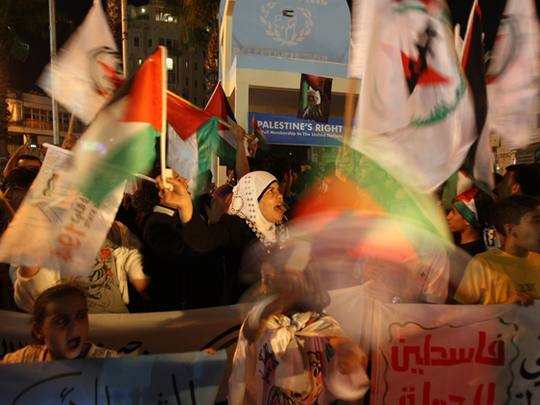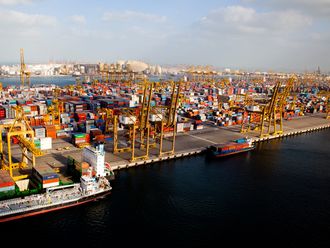
The Palestinian issue, more than any other wrangle in modern times, has huge overtones of a morality play and as an Indian living in this region, I have always been intrigued about what Gandhi, that apostle of peace and a strong advocate of morality above all in politics, had to say on this troubling matter. And all this takes on a special meaning on the eve of the upcoming historic debate and the move to table a resolution to recognise Palestine as a state in the UN.
A recent bestseller, Great Soul by Joseph Lelyveld, an old veteran at the New York Times fortunately throws light not only on Gandhi and the Palestinian question but adds a little spice as well. A clandestine effort is made to sly recruit the Mahatma for the Jewish cause and Lelyveld gives us a ring-side view of this duplicity in his brilliant book.
Nehru was the more vocal supporter of the Arab cause and the primary spokesman in all matters concerning foreign affairs, despite this, it was Gandhi who was approached furtively. The motive was more than the obvious, Gandhi the bigger name and the apostle of passive resistance. The reason for this was both straight forward as well devious.
The secret agent sent by the Political Department of the Jewish agency in Palestine was chosen specifically because he was a close buddy of Gandhi. Gandhi was not aware of this double dealing by his close friend of four decades, a relationship stretching back to his early struggles in South Africa.
Hermann Kallenbach is in an intriguing figure. He and Gandhi made a strange combination and Lelyveld examines this odd friendship in some great detail to the extent that some Indians have taken offence. Needlessly, because Gandhi comes out squeaky clean despite superficial evidence of a damning kind. But all this is takes us away from our main story.
Kallenbach was one among the many supporters of Gandhi of European stock. These converts to the cause were prepared to give up everything to follow their master, whether to work in the commune in Sotuh Africa called Tolstoy farm or in Sabarmati Ashram in Ahmadabad, India. In this gallery of disciples, Kallenbach is undoubtedly one of the more fascinating characters. A wrestler, bodybuilder and macho, yet a devotee of a man who preached non-violence.
They part ways after South Africa, Gandhi back in India, involved in the much bigger struggles while Kallenbach runs into trouble in South Arica, when he is interned as an enemy alien after breakout of the First World War. The two do not meet for more than 30 years until 1937-38 and the express purpose of this meeting is to recruit Gandhi for the Zionist cause. The Mahatma of course is blissfully unaware of these intrigues.
Before we move ahead, we need to step back to Gandhi and his Khilafat movement. The 1920s was the high tide of Gandhi’s herculean efforts to win favour with Muslims, who until then were sceptical and even dismissive of his ways. Non-violence, use of overly Hindu idioms in his fight against the British, his garb of a yogi — all of these made this seer a little suspect in their eyes. The Khilafat movement was Gandhi’s way to show solidarity with his brother Muslims.
This agitation was primarily to shore up support to Turkey and to force the Western powers from disbanding the Ottoman Sultan. A quixotic attempt at best, a brazenly opportunistic tactic at worst, this was not Gandhi at his best and shows yet again that he was not above breaking his own rules to win friends. No doubt to the anti-Gandhi crusaders all this is more grist to the mill that he was a hypocrite and humbug.
Lelyveld’s book, though, should put to rest these accusations because despite intense scrutiny on most of contentious issues Gandhi comes away looming larger than life. The title of the book is in itself Lelyveld’s way to pay homage to the great man. Gandhi’s failings only make him human and consequently his reputation stands burnished and not diminished.
To get back to our main story, Kallenbach stays on in India for more than a month doing a hard-sell of the Jewish stand to the Gandhi and hands out a twenty five page essay on the historical, spiritual and political underpinnings of Zionism. Gandhi is moved but with important caveats. I quote him in full: “In my opinion the Jews should disclaim any intention of realising their aspiration under the protection of arms. No exception can possibly be taken to the natural desire of the Jews to found a home in Palestine. But they must wait for its fulfillment till Arab opinion is ripe for it.”
Gandhi‘s message to Kallenbach is passed on to Chaim Weizmann who was the master mind behind this project in the first place. It is no surprise that this was never published. The conniving and scheming gone to waste and whole futile exercise abandoned. All this would have been lost in the dustbin of history but for Lelyveld’s book.
In this context, India’s stand on this continuing tragedy is worth recalling right from 1948 and even earlier. Nehru in 1930s was one of the first to question the theory propounded by Zionists, A land without people and a People without land; he emphatically rejected this outright then and India since has rejected this consistently.
In recent years India has been cozying up with Israel, despite this, it bears repetition that India was the first non-Arab country to recognise Palestine. India has been a firm friend of Palestine right from the beginning and this support is rooted in high moral principles. Principles, at the very heart of India’s own plurality and diversity; the foundation on which the nation was created in spite of horrifying challenges at its birth, consequently it is but natural that Palestine and India find common cause.
Ravi Menon is a Dubai-based writer working on a series of essays on India and on a public service initiative called India Talks.








